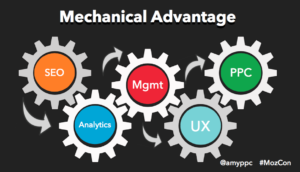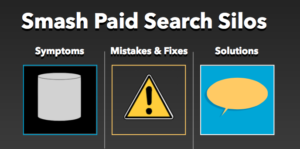
MozCon 2018: 2x Your Paid Search Revenue by Smashing Silos
The following post is part of WTWH Media Marketing Lab’s ongoing blog series from MozCon 2018.
Amy Hebdon, Co-Founder of Paid Search Magic, took the stage at MozCon 2018 and hit us with some awesome knowledge. She began by explaining how to smash silos in your work environment and how the only real solution to the problem of not working together, is to work together – but to do that, we need to speak the same language. When silos are created, they can lead to bad goals and KPIs. When you put all of your focus on traffic-based goals (clicks, impressions, average CPC) you tend to ignore the real needs of the business.

Image via Amy Hebdon
During her presentation, Amy modeled a recent case study on PPC optimization, to show that paid search management is just one aspect of a successful campaign and that good collaboration can give you a mechanical advantage. When teams are not collaborating, it can lead to miscommunications and paid search mistakes. To have a successful paid search campaign, teams need to build a communication bridge and start having paid search conversations. So how can you smash paid search silos within your organization? Start with recognizing the symptoms, identifying the mistakes and work toward a solution.

Image via Amy Hebdon
Silo Symptom #1: Bad Goals & KPIs
Leadership, marketing managers and sales teams tend to focus on goals that are often based upon traffic. The problem with focusing on traffic-based goals is that they can make things look great, but when you look specifically at the cost per acquisition or other metrics, the campaign is losing money. The fix is to avoid traffic-based goals because they are good for Google but bad for you. You should be measuring quality leads and sales and reporting on secondary metrics.
Solution: Identify how your paid search goals support your business growth.
Silo Symptom #2: Bad Human Experience
As marketers, we need to create experiences that are great for our visitors, but sometimes we can completely miss the human beings we are trying to reach. These experiences can start with an offer or landing page. Paid search puts your best offer in front of your target market. So, don’t call the visitors just to act. Give them a reason to act. Dedicated landing pages help improve performance, but driving to a simple form isn’t always the best solution when your visitors cannot find the answer they are looking for on your landing page.
Solution: Pages that answer users most important questions, outperform those that don’t. Ask yourself, do our visitors have what they need to want to act?
Silo Symptom #3: Bad Data
Management and dev teams should be working together to supplement and use performance data to drive strategy. When we don’t understand the data that is available, we cannot use it collaboratively. Data does not make the decisions, and teams end up getting stuck measuring everything and learning nothing. Use data to validate strategy, not to replace it.
Solution: Ask yourself, do you know what you’re tracking and why you are tracking it
The truth is, before we can change behavior, we have to understand why we engage in it. We can be experts in our own job specialization, and still, see the big picture of what we are trying to build for our business. When building a PPC campaign or any general marketing campaign, try starting a conversation with your team and see how your company can grow by smashing silos and working together.



Leave a Comment
You must be logged in to post a comment.